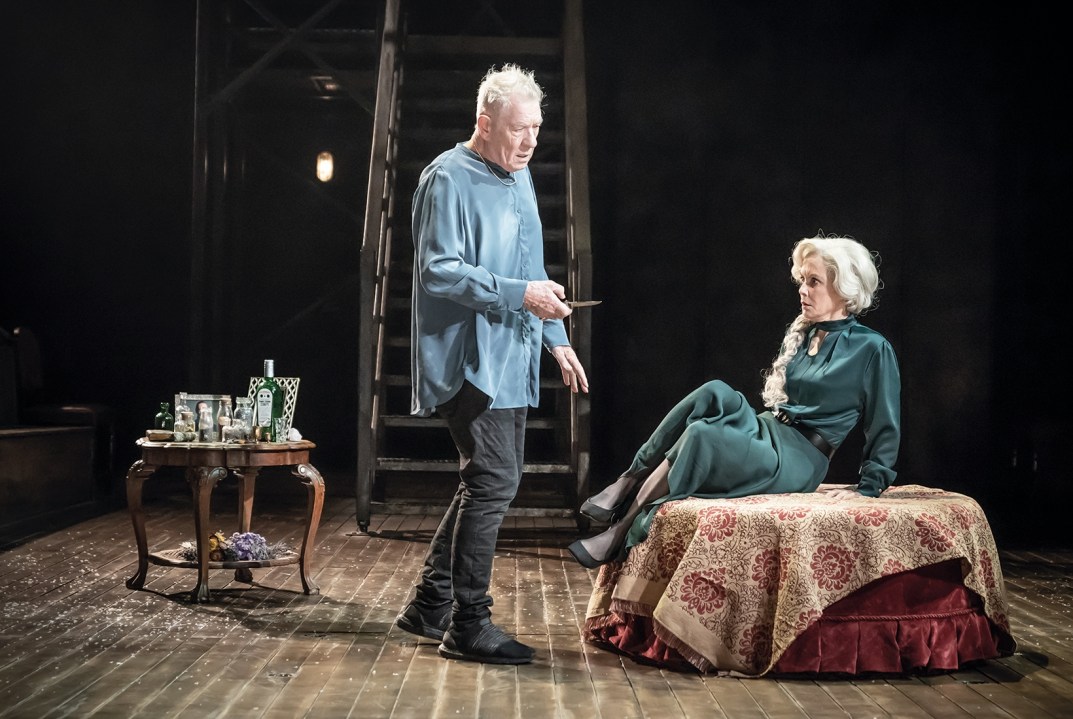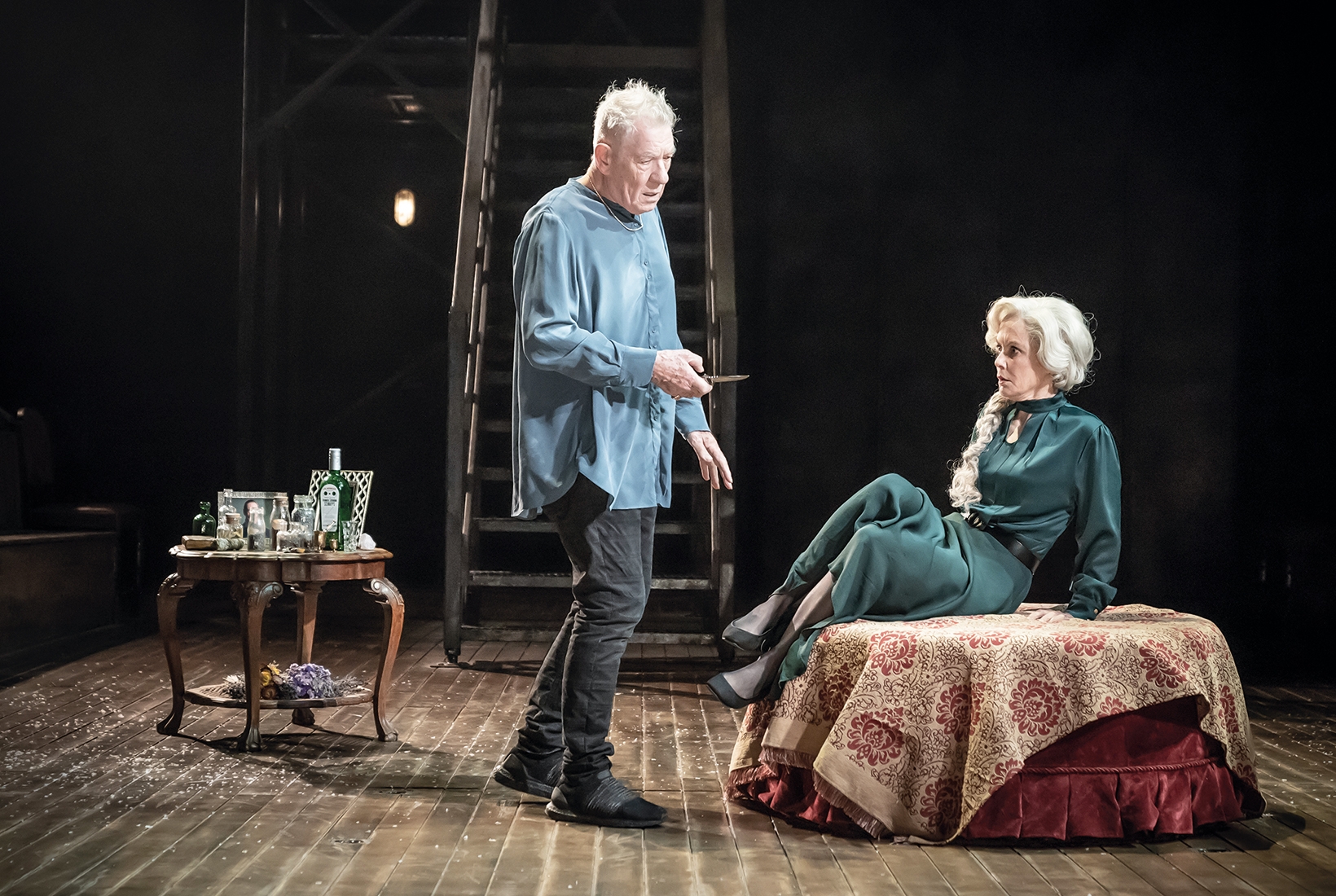Ian McKellen in his early eighties plays the Dane in his mid-twenties. A production with such a strange innovation should be conventional in all other details so that the virtues and demerits of the experiment can be judged in the right context. But Sean Mathias’s show adds extra puzzles. Elsinore is a modern palace ruled by Claudius, in a charcoal suit, and Gertrude in a chic emerald dress, pinched at the waist. Nice togs. But the audience knows how a constitutional monarchy works and that a rightful heir succeeds automatically and peacefully. So why are these murderous nutcases roaming the corridors plotting to slit each other’s throats? That contradiction goes unexplained.
As soon as McKellen appears, the age gap vanishes and the spirit of Hamlet comes bodying forth
Connoisseurs will get it but newcomers will be baffled and bored. Modern dress productions should welcome everyone and not deter all but the cognoscenti. Ashley D. Gayle plays Laertes as a sexy charmer with a vicious temper. Polonius is played by the excellent Frances Barber. Alis Wyn Davies is harder to judge because Ophelia is one of the worst parts Shakespeare ever wrote. She has to veer between misty-eyed infatuation and morose hysterics. Wyn Davies plays her as a singer-songwriter which is a neat idea. But she struggles to overcome the encumbrances of an acoustic guitar and a flapping multicoloured costume tailored from fabrics so loud that even Carrie would blush to use them. The poor design aesthetic extends to Hamlet’s clothes. He sports a drab selection of vests, anoraks and workout gear. Like all the other males in this 21st-century castle, he carries no weapon. When he stabs Polonius he uses a vegetable knife hidden up his sleeve. And he recites the ‘To be or not to be’ speech while standing in a barber shop with a red swivel chair. Other soliloquys are delivered from an exercise bike. This is novelty for novelty’s sake, not an honest attempt to liberate new truths from the text.
But these faults don’t detract from the beating heart of this production — McKellen. As soon as he appears, the age gap vanishes and the spirit of Hamlet comes bodying forth. A sensational performance, crisp, unpredictable, witty, noble, silly, humane. What a range of effects and moods. Riveting to watch. Mathias adds a couple of deft touches at the end. Gertrude arrives in a state of advanced drunkenness to watch her only son take on Laertes in a lethal duel. And Hamlet dies in the vertical position, propped up by Horatio. His exit line, ‘the rest is silence’, can be heard for a change, and his tragic expression seen. Those innovations should be incorporated in all future Hamlets.
David Mamet’s Oleanna opens as a cosy chat between a smug middle-aged professor and a nervy student, Carol, who suffers from low self-esteem. The prof reveals that he had similar doubts about his intellectual powers when he was younger and he offers her extra one-on-one tuition. Carol interprets this as a sexual proposition and her misreading of his actions leads to catastrophe. The question is, what motivates Carol? Our sympathies are loaded against her because the professor, played with a ruffled, easy charm by Jonathan Slinger, captures all our sympathy. We hear about his background, his childhood struggles, his current hopes as a family man and a rising star of the faculty. Carole, by contrast, is a cube of ice, a friendless girl-from-nowhere without any social contacts apart from a mysterious ‘group’ of activists who feed her paranoia. The prof’s error is to indulge in over-sophisticated irony and to satirise academia as a futile but amusing bourgeois ornament. Doubtless his peers at high table enjoy this self-deprecating rhetoric but Carol is maddened to hear her intellectual dreams being mocked by a preening careerist. And so the battle begins. Carol denounces him to the authorities. Then she lobbies to have his book removed from the syllabus. Finally she calls the police. These scenes unfold like a trial, and here the imbalance is reversed. Carol, the accuser, has all the power, and the good-natured professor becomes an impotent observer of his own downfall.
The play, written in 1992, amazingly predicts the culture wars of the present day, when a life’s work can be instantly erased by digital mobs, and where the concept of innocence has been supplanted by the expectation that every defendant must and will be convicted. This is a unique play, a beautiful, gruesome, slow-burning 90-minute countdown to an outrageous explosion of violence. Director Lucy Bailey’s thrilling production is a work of exquisite artistry, of casually escalating horror and menace. If you want your teenagers to develop a taste for playgoing, here’s a show that could hook them for life. Theatrical opium.








Comments